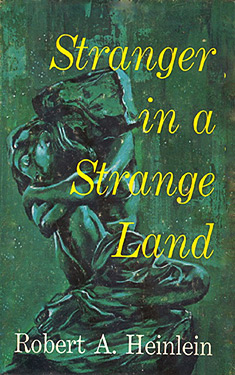Robert A. Heinlein
Completed Feb 2013, reviewed 4/13/2013
3 stars
I enjoyed this book, but I’m not sure if I actually liked
it. I liked the basic premise: a human,
Valentine Michael Smith, born and raised on Mars by Martians comes back to
Earth and becomes a new Messiah. The
writing was good; it kept my interest and kept me reading. My biggest problem with the book was that it
felt like two very different books mashed together. The first “book” is a chase, trying to free
and hide the human Martian. The second half
is an in-your-face polyamorous hippie commune-based messiah story. At times, I found the long dialogues arguing
and supporting the polyamorous society to be not much more than well-written
propaganda. And there’s quite a style difference
between the two halves.
From my research, I've found that it was quite shocking when
it was first published. I am a little
perplexed that this book is now located in the young adult fiction section at
the library. While not shocked by the
polyamory, I find it amazing that our conservative vocal minority, even in my
liberal town, doesn't meet nightly at libraries with torches, ready to burn the
book, or at least keep it out of the young adult section.
All of Heinlein’s books can be seen as, in some way or
another, simply essays on war, libertarianism and polyamory. But Heinlein does it so well! If the book weren't so well written, I
wouldn't have given it the stars I did.
Of course, the female characters never seem to make it above
being secretaries or supporting wives. At
least they were a little more fleshed out than Starship Troopers or Moon is a
Harsh Mistress. This is most evident
with Gillian Boardman, a nurse who discovers and rescues Valentine Smith from
the government, starts out as a strong woman in the first half of the book, but
her character’s strength dissipates in the second half. The homophobia and racial slurs also caused
me trouble. As usual, I have to step
back and realize who wrote it and when.
I really love that in all three of these books, Heinlein
uses the device of the old smart man. In
Moon and Troopers, he’s a professor.
Here he’s an old writer/lawyer/doctor, kind of a Deus ex machina, all-wise
and compassionate, having tons of money, and getting the main characters out of
trouble. I liked him more than Smith, who
almost becomes a caricature by the end.
I gave the book 3 stars.
Because it is so well written, I wanted to give it 4, but I knocked off a
star for the significant change in writing style between each half of the book,
for how he just had to put down gays and other minorities, and for turning all
the strong women into Ivory Soap Girls.

No comments:
Post a Comment